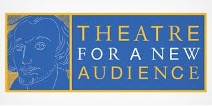Organization
Founded in 1979 by visionary Jeffrey Horowitz, Theatre for a New Audience (TFANA) is a New York home for Shakespeare and contemporary playwrights, which nurtures artists, culture, and the community. With Shakespeare as its guide, TFANA explores the ever-changing forms of world theatre and builds a dialogue spanning centuries between the language and ideas of Shakespeare and diverse authors, past and present.
TFANA has grown from a small theatre into a nationally and internationally renowned modern classical theatre, mounting several productions each season, exploring the endless forms of theatre from around the world, and creating a dialogue between Shakespeare and a range of plays from the past and present about our world. Each season an audience of 30,000 to 50,000 patrons attend TFANA’s productions.
Many of the finest American and European theatre actors and directors including Julie Taymor, Peter Hall, Simon Godwin, Christian Carmargo, Mark Rylance, John Douglas Thompson, Michael Shannon, Kathryn Hunter, David Strathairn, and Diane Wiest have collaborated with TFANA, often on multiple productions. Several productions in the past have transferred to Broadway, and various co-productions with other theatres, including in recent years Soho Rep., Wooly Mammoth, and Rattlestick, have performed on and off Broadway.
In 2001, TFANA became the first American theatre to be invited to bring a production of Shakespeare to the Royal Shakespeare Company (RSC) when Cymbeline, directed by Bartlett Sher, opened at The Other Place, in Stratford-upon-Avon. In 2007, TFANA returned to the RSC for its Complete Words Festival with The Merchant of Venice, starring F. Murray Abraham as Shylock and directed by Darko Tresnjak. To date, TFANA has produced 33 of Shakespeare’s 38 plays.
Education is a cornerstone of TFANA’s mission. TFANA created and runs the largest in-depth program to introduce Shakespeare and classic drama in New York City’s public schools. Since its inception in 1984, the program has served more than 140,000 students. As an organization committed to economic access, TFANA offers Pay What You Can Performances, and its New Deal Ticket Initiative offers $20 tickets to those aged 30 and under and full-time students of any age for all dates of every production.
In 2013, TFANA opened its first permanent home, the Polonsky Shakespeare Center (PSC), located in the heart of Brooklyn’s cultural district. Designed by celebrated architect Hugh Hardy, PSC combines an Elizabethan courtyard-style theatre with modern technology, offering state-of-the-art and accessible spaces for artists and audiences. The facility includes the flexible Samuel H. Scripps Mainstage theater with 299 seats, and the 50-seat Theodore C. Rogers Studio, as well as rehearsal spaces and classrooms. TFANA partners with local schools, cultural institutions, and community groups across New York City to make theater accessible and relevant to a diverse audience.
TFANA is governed by a 37-member Board of Directors, including a robust Artistic Council, led by Robert E. Buckholz, and is supported by a distinguished Council of Scholars. Horowitz will retire August 31, 2025, and the Board has begun a search for a new artistic director and a new executive director who will jointly lead TFANA beginning September 1, 2025.
For the fiscal year ending August 2024, annual revenues were $5.6 million, with approximately $3.3 million from contributions and grants. TFANA’s permanently restricted endowment stands at $10.2 million.
Position Summary
The Artistic Director will lead the creation and implementation of TFANA’s artistic vision, ensuring alignment with the organization's mission and values. Reporting to the Board of Directors and collaborating with the newly established Executive Director, the Artistic Director will forge strong relationships with artists, donors, audiences, and community stakeholders. With deep experience and passion for both classical and contemporary work, they will provide strategic leadership in season planning, artistic and educational programming, and the selection of creative teams. By fostering a transparent, collaborative, and consensus-driven decision-making process, the Artistic Director will ensure that TFANA's productions and programs reflect the highest artistic standards while advancing the organization’s goals and growth.
Role and Responsibilities
Artistic Vision and Producing
- Conceive and implement TFANA’s artistic vision through curating seasons of exciting and diverse productions, in alignment with the organization’s mission and values.
- Engage and collaborate with artists to conceptualize, develop, and execute productions, workshops, and other programming.
- Partner with directors on casting, forming a creative team, hiring designers, and overseeing the design process for physical productions.
- Collaborate with playwrights, directors, designers, and other artists to effectively implement their vision and create original works, new adaptations, and revivals that challenge and engage audiences.
- Champion diverse voices and stories that reflect the community, promoting equity, diversity, inclusion, and access in all artistic decisions.
- Implement the culture and tone for each production process, ensuring that the process remains aligned with TFANA’s values, including equity and inclusion.
- Identify and mentor emerging artists, fostering new talent and creating opportunities for creative collaborations.
- Engage in long-term artistic planning, balancing contemporary work with classics to attract broad audiences and maintain a high quality of artistic excellence.
- Provide feedback to lead artists, and synthesize internal and external feedback
- Maintain awareness of labor practices and union agreements, to inform future strategic decisions for TFANA relating to artistic, managerial, and financial matters.
- Provide production budget oversight in collaboration with the Executive Director and General Manager.
- Maintain co-producing relationships and identify new co-production opportunities.
- Embrace Other Artistic Vision and Producing responsibilities, as needed.
Community and Audience Engagement
- Communicate the vision and work of TFANA to its full range of stakeholders, including artists, staff, donors, Board members, press, and the audience.
- Cultivate relationships with local schools and organizations, creating meaningful partnerships and educational initiatives.
- Advocate for TFANA’s role as a cultural leader, representing the organization as a public spokesperson at conferences and community events, while building relationships that foster ongoing support and engagement.
- Oversee the design and tone of communications, marketing, and educational materials, ensuring that TFANA’s artistic vision and mission are accurately and consistently represented and that it reaches new audiences through innovative strategies.
- Establish positive and productive relationships with Board members and donors, educating them about the work and fostering curiosity and support.
- Embrace Other Community and Audience Engagement responsibilities, as needed.
Organizational Leadership and Board Relations
- Partner with the Executive Director in providing visionary leadership to all staff and artists, aligning TFANA’s artistic goals with financial sustainability and strategic objectives.
- Foster a creative, inclusive, and supportive organizational culture, where people from all backgrounds are welcomed and treated fairly.
- Serve as an active participant in fundraising efforts, collaborating with the development staff to cultivate relationships with major donors, foundations, and sponsors.
- Guide the production process, resolving any production issues, in collaboration with the General Manager and Production Manager.
- Problem-solve significant creative or personal conflicts that arise on productions and programs or among staff.
- Serve as a partner to the Board and attend all Board and Executive Committee meetings, as well as other Board committee meetings as required.
- Embrace Other Organizational Leadership and Board Relations responsibilities, as needed.
Traits and Characteristics
The Artistic Director will be a dynamic and inspiring visionary, who is able to creatively solve problems and galvanize others to realize the artistic vision of each production. A lover of Shakespeare, they will be a human-centered leader, who is a compassionate and thoughtful mentor to younger artists and staff, and cares deeply about other artists and their work. As a proactive communicator, they will be skilled in advanced planning and delegating, collaborating effectively with individuals and teams from all backgrounds.
Other key competencies include:
- Leadership and Teamwork – The ability to organize and influence people to believe in a vision while creating a sense of purpose and direction.
- Personal Accountability and Interpersonal Skills – The capacity to be answerable for personal actions while effectively communicating, building rapport, and relating well to all kinds of people.
- Diplomacy and Resiliency – The dexterity to effectively and tactfully handle difficult or sensitive issues while quickly recovering from adversity.
- Time and Priority Management – The acumen to prioritize and complete tasks in order to deliver desired outcomes within allotted time frames.
Qualifications
The Artistic Director will have a significant body of work, either as a producer and/or director. They will have experience in fundraising and donor cultivation. They will demonstrate a deep knowledge of Shakespeare and other major classic and contemporary playwrights and have a network of existing relationships with national and international Shakespearean-based artists. Experience in creating and maintaining large budgets, ideally six figures or higher, is preferred. A commitment to championing and implementing equity, inclusion, diversity, accessibility, and anti-racism collaboration methodologies is critical. No specific number of years of experience or specific educational credentials are required.
Compensation and Benefits
TFANA offers a competitive and equitable compensation package in the range of $220,000 to $250,000. Benefits include paid time off and holidays; health insurance; long-term disability and life insurance; and a voluntary 403(b) retirement plan.
Applications and Inquiries
To submit a cover letter and resume with a summary of demonstrable accomplishments (electronic submissions preferred), please click here or visit artsconsulting.com/opensearches. For questions or general inquiries about this job opportunity, please contact:
Adam Davis, Senior Vice President
Geoff Chang, Vice President

1040 First Avenue, Suite 352
New York, NY 10022-2991
Tel (888) 234.4236 Ext.215 (Davis) Ext. 218 (Chang)
Email TFANA-AD@ArtsConsulting.com
TFANA honors the Lenape and Canarsie People on whose ancestral homeland PSC is built.
TFANA is committed to attracting, hiring, and retaining employees who reflect the cultural diversity of our community. We believe that every employee has the right to work in a respectful environment that is free from discrimination, consistent with our commitment to diversity, equity, inclusion, and respect. This commitment extends to all aspects of the employment relationship.
Click here for the downloadable PDF.

